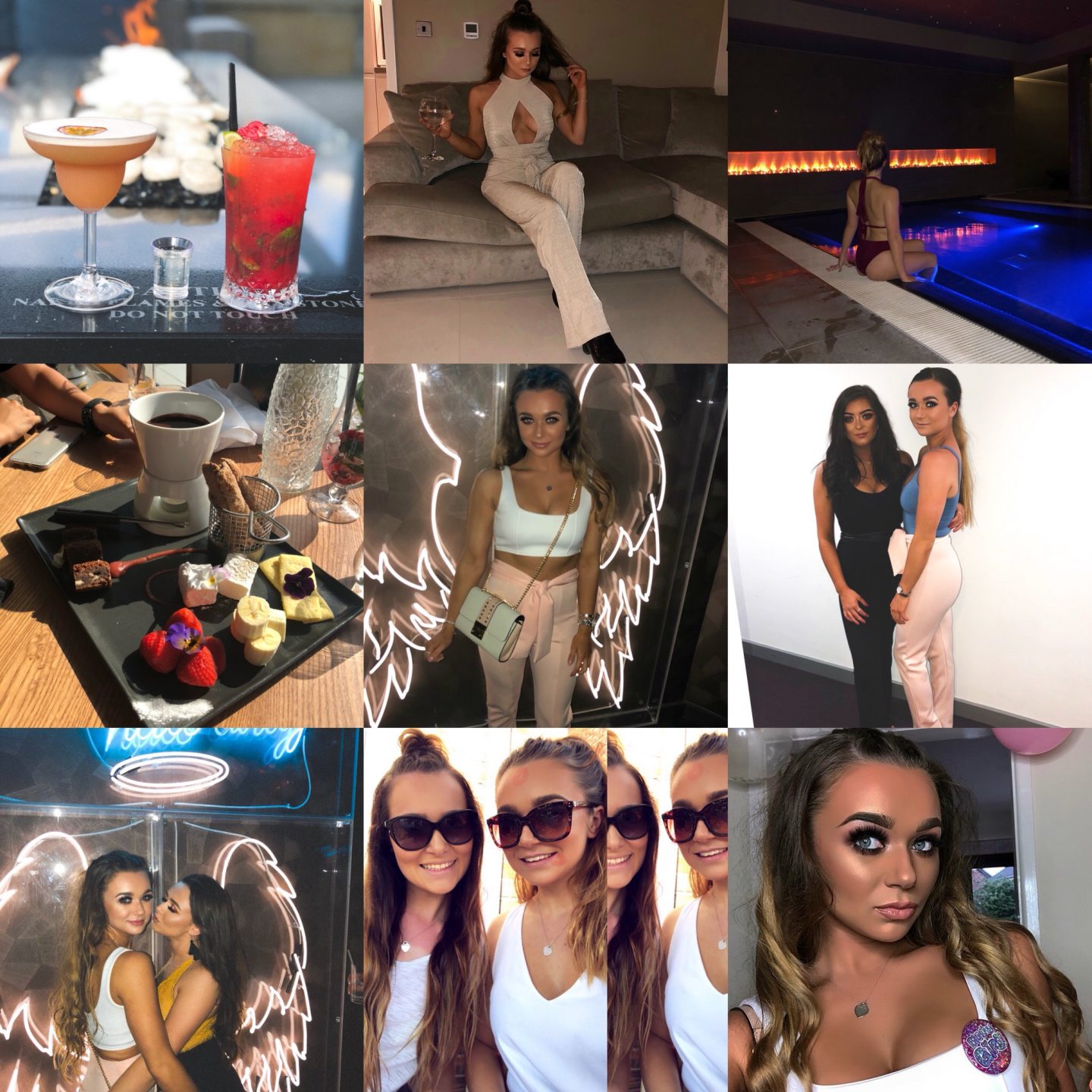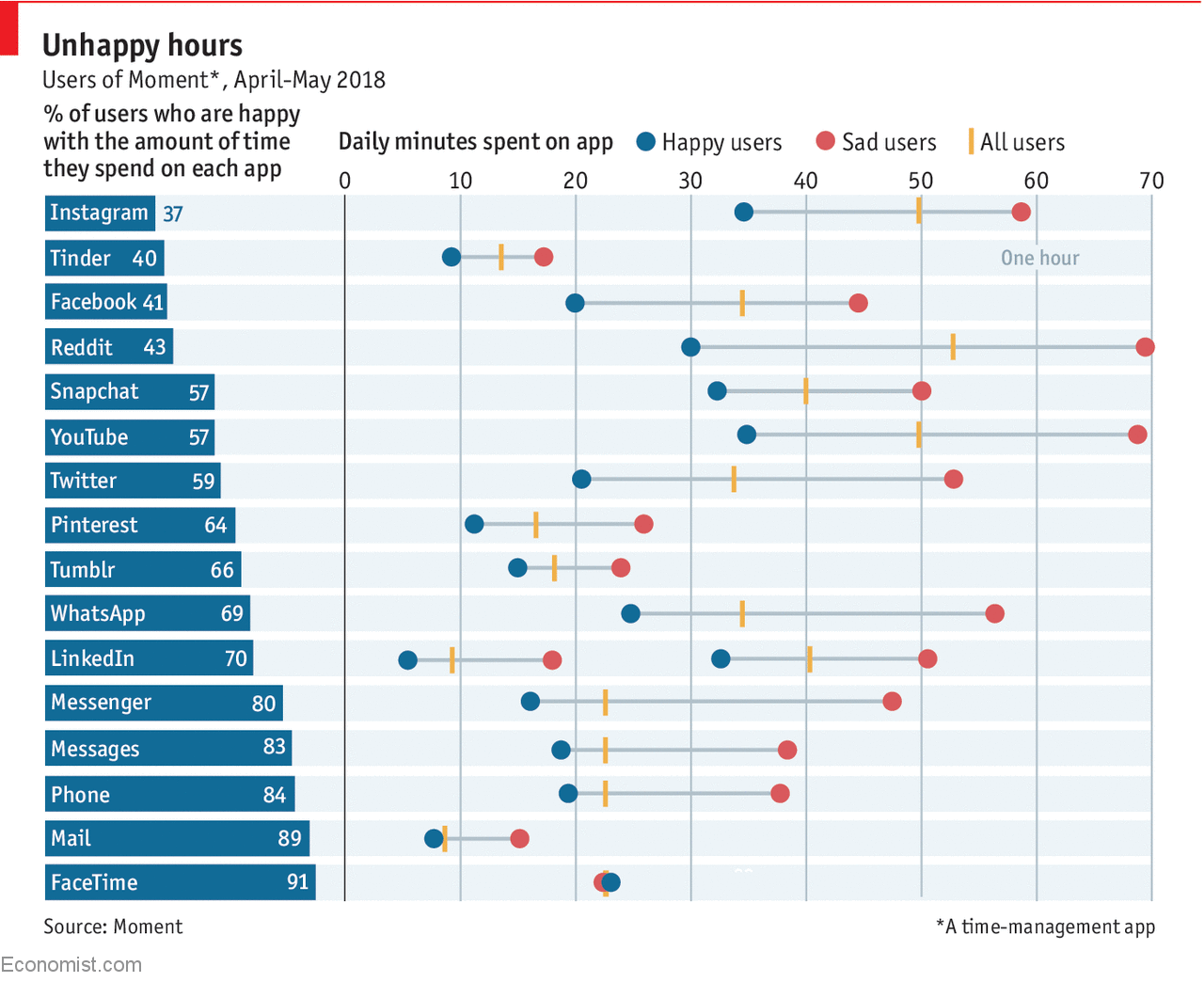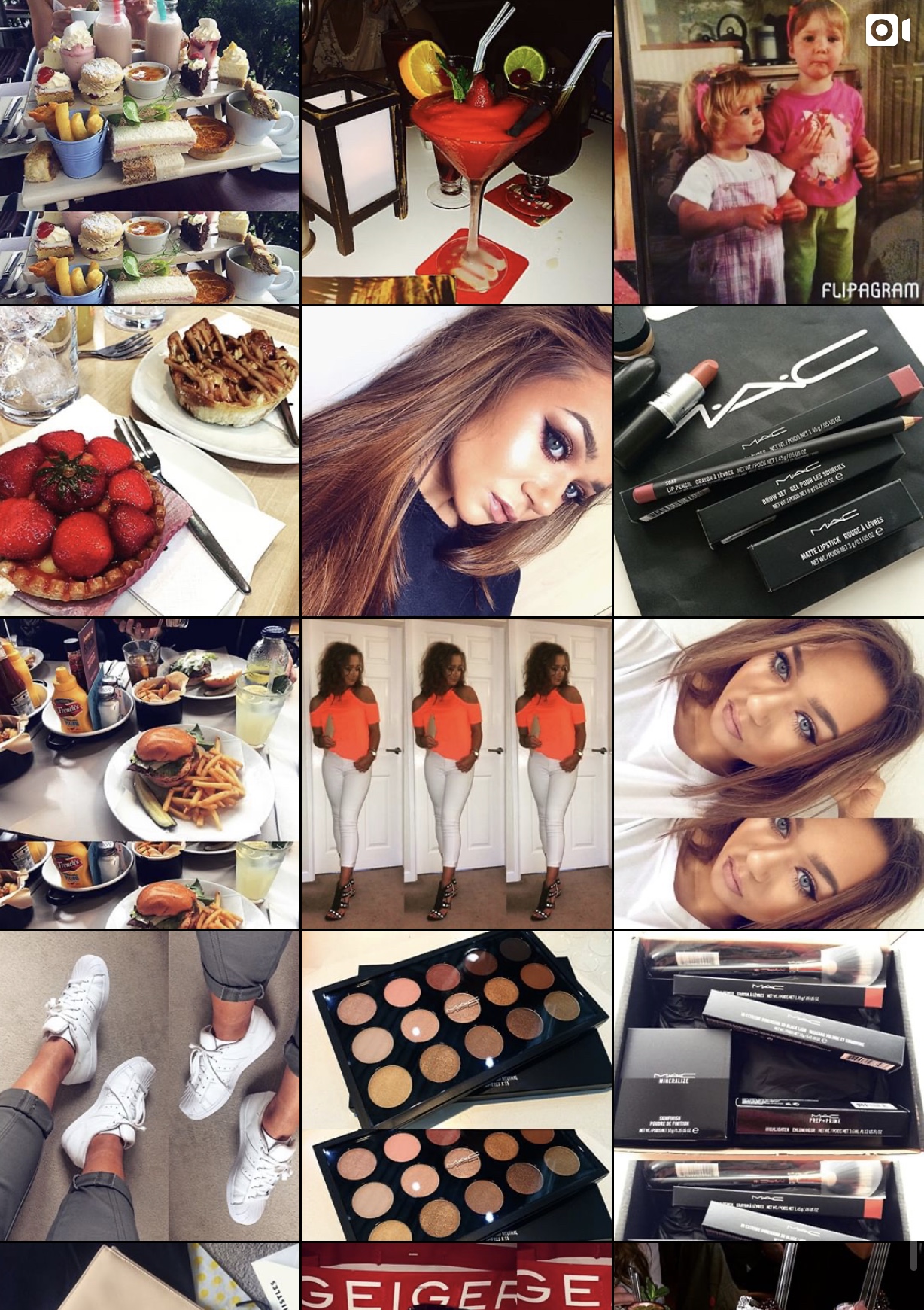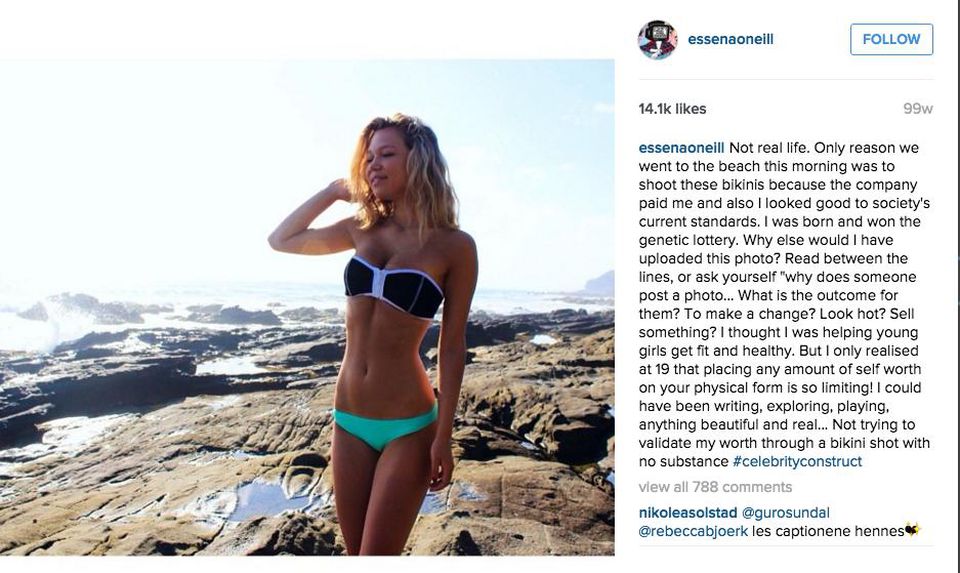
Exploring the detrimental impact of Instagram on young people
Firstly, yes, I did just make up the word Instagramification. Or is it already a word? Who knows. Whilst sat here scrolling endlessly through my feed and feeling the pulsing pain of RSI in my thumb joint, countless thoughts and multiple emotions popped up and then disintegrated in my brain as I consumed post after post.
I’m writing this for those of you currently feeling the ramifications of Instagram. Reading this article back, I feel pretty silly. But I think sometimes you need to be honest with yourself (and others) so that they too can resonate with you (or just read this and think you’re a sad, social media obsessed freak).
But have you ever found yourself tangled up in the negative, dull, empty feeling of Instagram? Have you experienced the Instagramifications?
After seeing Dominic McGregor’s ‘Social Unhappy Hours’ (pictured below) and Instagram with a whopping 63% of unhappy users, I thought this article was necessary for your mental health, your state of mind, a bit of a rant on my behalf and just for a bit of reassurance for those feeling the self-esteem sucking black hole of Instagram. We all need a little bit of reassurance sometimes.

In a 2017 article by the Independent, they discussed a survey of 1,500 young people (aged between 14 and 24) and their social media usage. The social platforms were scored against certain issues including depression, anxiety, loneliness and FOMO (fear of missing out).
“Based on the ratings, Instagram was listed as having the most negative effect. It was found to harm perceptions of body image, increase the fear of missing out and have a detrimental effect on sleep.”
Have you ever found yourself tangled up in the negative, dull, empty feeling of Instagram? Have you experienced the Instagramifications? To me, this means the complex and unwelcome consequences of Instagram. My experience with Instagramifications consisted of four steps in two different stages. First was the jealousy and self-destruction. My green with envy hulk finger reluctantly double-tapped that girl’s new BMW or that candid picture of Hannah looking incredible on her night out ‘with the gals’ as I sat in my snowman pyjamas watching Netflix on a Saturday night.
The jealousy and self-destructive stages
By no means do I hate Instagram. I love Instagram now, but that doesn’t mean it hasn’t had a detrimental impact on how I saw myself. I use Instagram every single day and I absolutely love the way I can craft and perfect my feed to look really aesthetically pleasing to the eye. So by no means do I want to come across hypocritical in this article. Because yes, I do touch up my pictures by smoothing under my eyes where I have dark bags and airbrushing blemishes – but I am pretty honest about that, as are many other makeup bloggers in 2020. But this article is for everyone who was like me in 2014. For everyone who was absolutely CLUELESS to it all…
What I didn’t know back in 2014 was that people actually used apps like UNUM (which I now use shamelessly) to design their Instagram feed before uploading posts. People edit all their images with pre-sets and filters in Adobe Lightroom before uploading (which I now do, also). Influencer’s now SELL their pre-sets for relatively high prices to eager users aspiring to have good quality visuals like them. Extreme editing apps allow you to warp and reshape any body part you desire. Airbrushing apps allow people to perfect their features to unrealistic standards. Last year, I saw an advert on my feed that allowed you to add abdomen muscles to your picture. When you think about it, it’s almost like a distorted fantasy. But this was something I wasn’t aware of when I was 16 and in Year 11 with bad acne and braces.
I simply couldn’t accept that Instagram was an online portfolio of people’s best work; the work being themselves. I just simply thought I wasn’t good enough. And I based this belief on the number of likes on my posts.
Then came the self-destruction. Everywhere I went I sought a tea room that was Instagrammable. By 2016, I became so absorbed with the app that I could tell from the interior of a restaurant whether I could upload a picture of my food or not. I could source and spot specific locations that would look good on my Instagram. I’d be annoyed if my photo wasn’t at the right standard for my feed or if my spoon was wonky next to my cute drink. Every holiday I went on, I considered the background aesthetics, the lighting, how it would look with my other images already on my feed. I wasn’t experiencing anything I did. It was scary.
My 2016 Instagram feed: arranging and positioning items to get that ‘perfect Instagram picture’. It was an unusual obsession that back then, I couldn’t fathom.

To cut a long and tragic story short about the deterioration of my mental health, it made me miserable and sad. I simply couldn’t accept that Instagram was an online portfolio of people’s best work; the work being themselves. I just simply thought I wasn’t good enough. And I based this belief on the number of likes on my posts.
The realisation that leads to appreciation and acceptance
When I carefully think back about how I felt in 2016, the proof that Instagram is a fantasy-world was in everything I did. I chose who to follow. I crafted and picked my own timeline of self-destruction. I was the one who took 100 photos before choosing ONE to upload. I was the one who crafted my background, who arranged items to make them look good so I could photograph them. Everything I did, these people I was comparing myself to also did the exact same to achieve their excellent visuals. I really had experienced the Instagramifications on my mental health. Now it was time to accept the platform for what it was: an online portfolio.
Essena O’Neill
“We are a generation taught to consume and consume. With no thought of where it all comes from and where it all goes.”

Essena O’Neill was an ‘Insta-Girl’ renown for her vegan, lifestyle and fashion blogging. In 2015, she quit social media. She edited the captions of all her paid promotions to the cynical TRUTH. And trust me… it was brutal. Just read the caption above and below. It left 17-year-old me shooketh. 19-year-old Essena O’Neill had far more knowledge of the mental implications of social media before any social expert in today’s generation. Sometimes, I wonder if she influenced Instagram to introduce the #ad and paid promotion stamp feature.
“I could have been writing, exploring, playing, anything beautiful and real… Not trying to validate my worth through a bikini shot with no substance.” – Essena O’Neill

Appreciation and Acceptance
After the self-destruction and obsession with trying to compete with every single person on my newsfeed, I reached the appreciation and acceptance stage. Without acceptance, you will not be able to appreciate, just like without appreciation, you will not be able to accept.
I realised nothing on Instagram is real.
I began to appreciate what the people on my newsfeed had. I began to love what they had achieved. Behind the pictures, I knew they too had spent a lot of time crafting that one image. I knew that it was filtered, posed, artificially lit and planned to the point of perfection. I was able to appreciate that these people chose what I could see in their life. They decided what highlight they wanted to share with me and that is when it clicked. When you get in from a ten-hour shift, do you take a picture? When you drive to your friend’s house, do you take a picture and post it? When you’re hungover on a Sunday morning and being drove to Maccies by your mum because you’re still drunk, do you take a picture for Instagram? What about when you get that McDonald’s? Do you Instagram your Chicken Mayo?
The point is, everyone’s Instagram feed is a perfected, crafted, online portfolio of the highlights in their life. So of course, your feed is going to be full of envious posts. When you collate a person’s highlights together, you get a huge portfolio of incredible moments, or in other words, an Instagram profile.
This is when I started to appreciate more and more; whilst caring less and less. I realised nothing on Instagram was raw footage from a captured moment. It is our choice to share the best, most interesting moments of our life on this platform. Just as it is the consumer’s choice to absorb this content.
The pressure to be liked and accepted from social media affects everyone at some point in their life. I believe it stems from not being able to accept that everything you see is not necessarily real; as well as the inability to accept that the number of likes on your post does not define your value or worth. Everyone is made up of their own incredible qualities in their own unique and original way. You do not need a double tap to feel accepted or appreciated, and if you do, it’s time to switch off.
This is why I chose the word Instagramifications. To me, this means the complex and unwelcome consequences of Instagram.
Once you can accept and appreciate other people’s different lifestyle, you will feel a lot happier about yourself. And if it gets too much, simply switch off. Only you can do it, no one else. Stop forcing yourself to absorb such content. Just look away. Read a book, go on a walk, ring a friend, go get some snacks from Tesco.
The day I stopped comparing myself to everyone on my newsfeed was a turning point in my life: mentally and physically.
